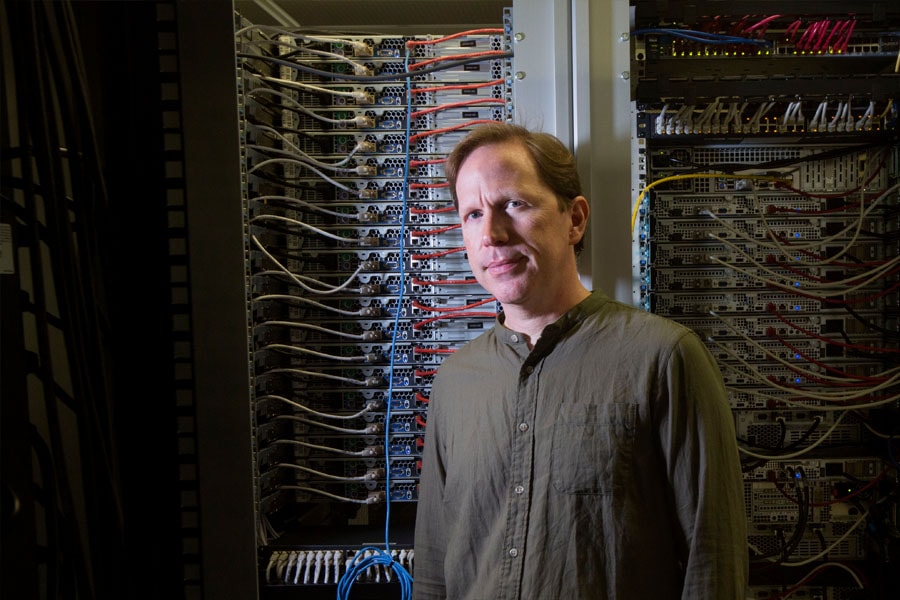Alumnus Named MacArthur Fellow
By Heidi Opdyke
Cybersecurity expert Stefan Savage, a 1991 graduate of Carnegie Mellon University's Dietrich College of Humanities and Social Sciences, is one of 24 winners of MacArthur Foundation Fellowships, often known as "genius grants," this year. He will receive $625,000 over the next five years.
Savage is a computer scientist at the University of California at San Diego. He received his bachelor's degree in applied history from CMU, and a Ph.D. in computer science from the University of Washington in 2002.
Savage uses an interdisciplinary approach to address challenges to computer security, counter cybercrime and shape cybersecurity debates.
The growing prevalence of physical "smart" devices has made network cybersecurity a priority. Savage and colleagues were the first to demonstrate the ability to hack an automobile remotely — including taking control over the engine and brakes and monitoring conversations taking place within the car. He and collaborators also have identified a critical bottleneck for spam email campaigns and online counterfeit goods transactions.
In addition to identifying technological deficiencies, he contextualizes cybersecurity threats within much broader ecosystems, including underlying economic incentives and social structures contributing to vulnerabilities.
"It's very exciting to get to work on something that is both intellectually stimulating and at the same time creates an opportunity to make the world a better place for people and for them to be safer online," Savage said in a video interview. "The fellowship will allow me to reach the people I need to reach with my research results and my message."
Steven Schlossman, professor of history, taught Savage during his junior year at CMU.
"Stefan Savage took a broad range of classes in social, political and policy history and was one of the early graduates of the unique applied history major," Schlossman said. "He did quite well in the major, took graduate-level courses as an undergrad and completed the senior project course with Professor Joel Tarr, one of the founders of the major. We are thrilled that one of our graduates built so creatively on the historical, social science and computer science foundations he received here and expanded them into a wildly successful career path."

Stefan Savage
Savage, whose CMU coursework also included cognitive psychology, computer science and other history courses, said his undergraduate studies prepared him well for graduate school.
"I realized that my courses in history and cognitive psychology gave me a huge unfair advantage over my peers," Savage said. "They had learned to solve differential equations while I had spent the time having to write, speak and argue — precisely the tools needed in graduate school."
Savage said Schlossman's class was "instrumental in teaching me that so-so arguments didn't cut it, and that crisp critical thinking was essential to make points effectively enough to convince doubters." He added that Lynne Reder, a professor of psychology, gave him the opportunity to think about how to measure things that were really difficult to measure, something that he is still working on.
CMU computer science professors also had a profound impact on him including current School of Computer Science Assistant Dean for Outreach Mark Stehlik and former faculty members Hide Tokuda and Brain Bershad, who both hired him as a research programmer.
"By the time I graduated with my bachelor's of science in history, I was pretty sure I wanted to continue working in computer science," he said.
At UC-San Diego, Savage is a professor in the Department of Computer Science and Engineering, co-director of the Center for Evidence-Based Security Research and co-director of the Center for Networked Systems.
When offering advice to students, he encourages them to identify their strengths.
"I encourage people to think about what problems give them an unfair advantage," he said. "Are you good at finding new problems or solving old ones? Go through a few of these to try to understand where your strengths and weaknesses are. I've long since given up trying to tell my students what to work on, people only do great work if they are curiosity driven."
Previous MacArthur Fellows with Carnegie Mellon connections include 2010 graduate Dawn Song, alumnus and faculty member Luis von Ahn, and former faculty members Terrance Hayes and Yoky Matsuoka.
This story was updated Oct. 18.